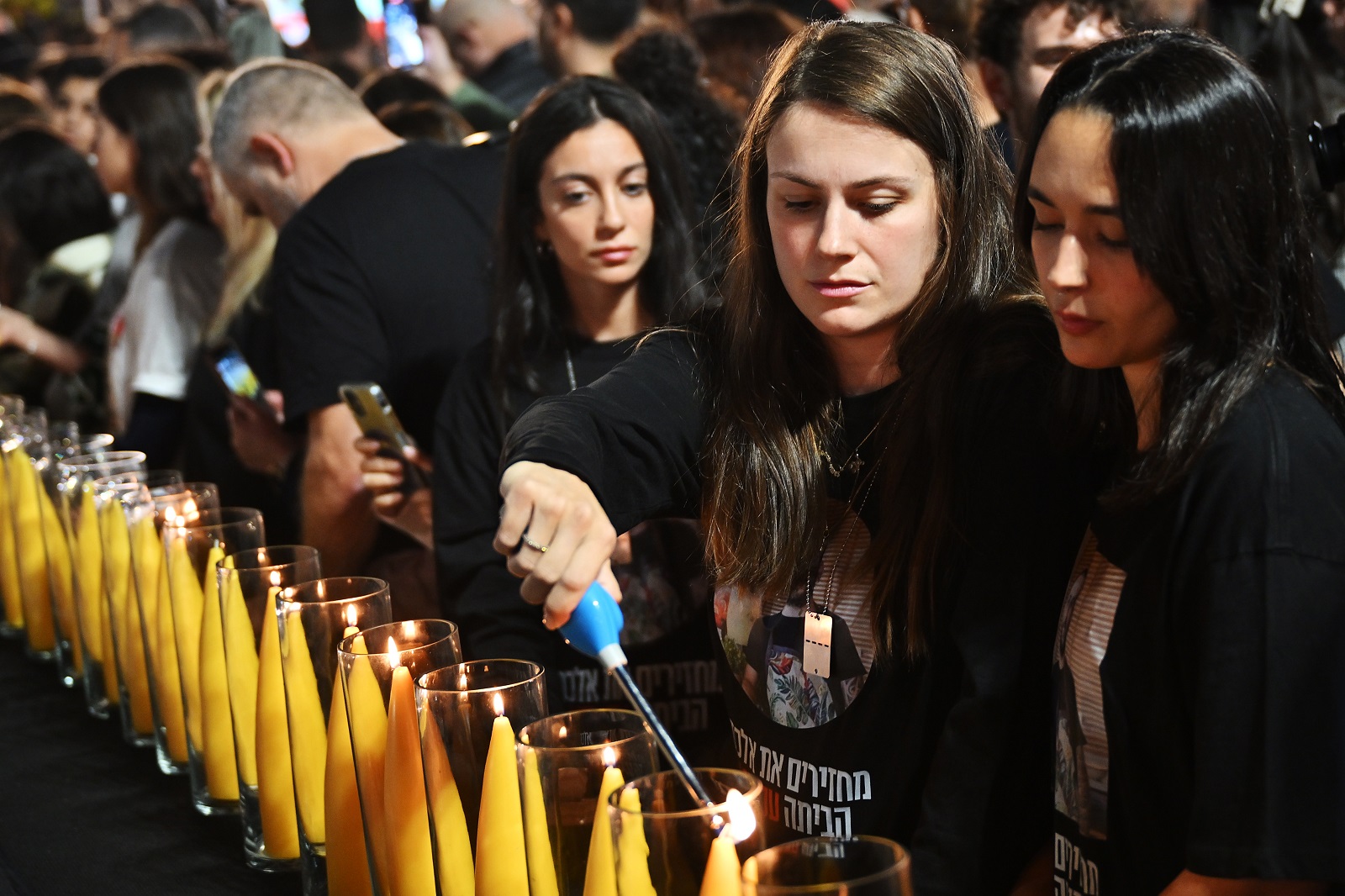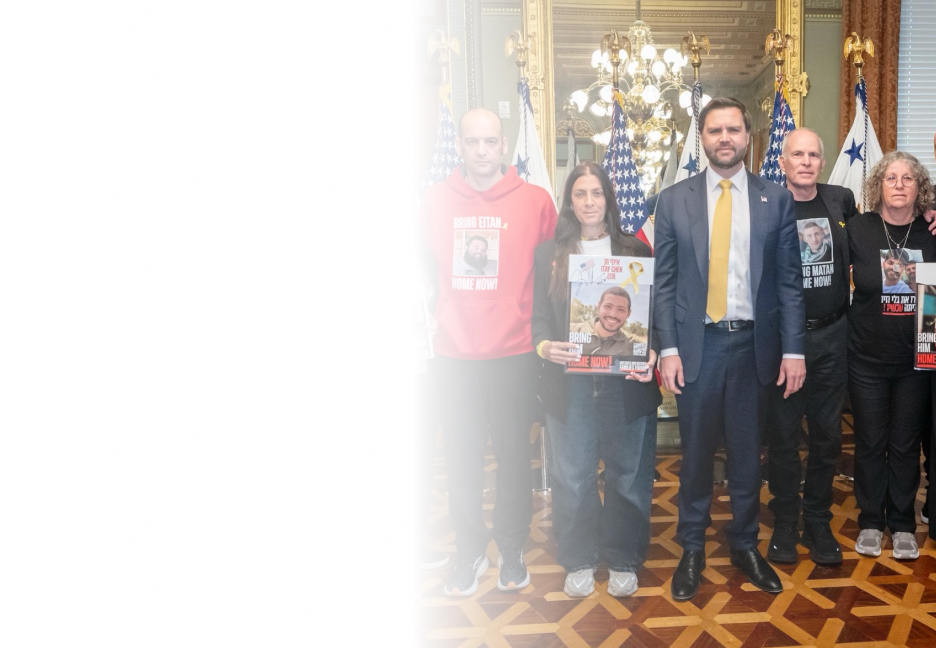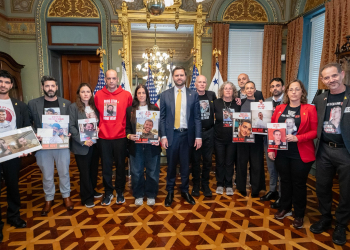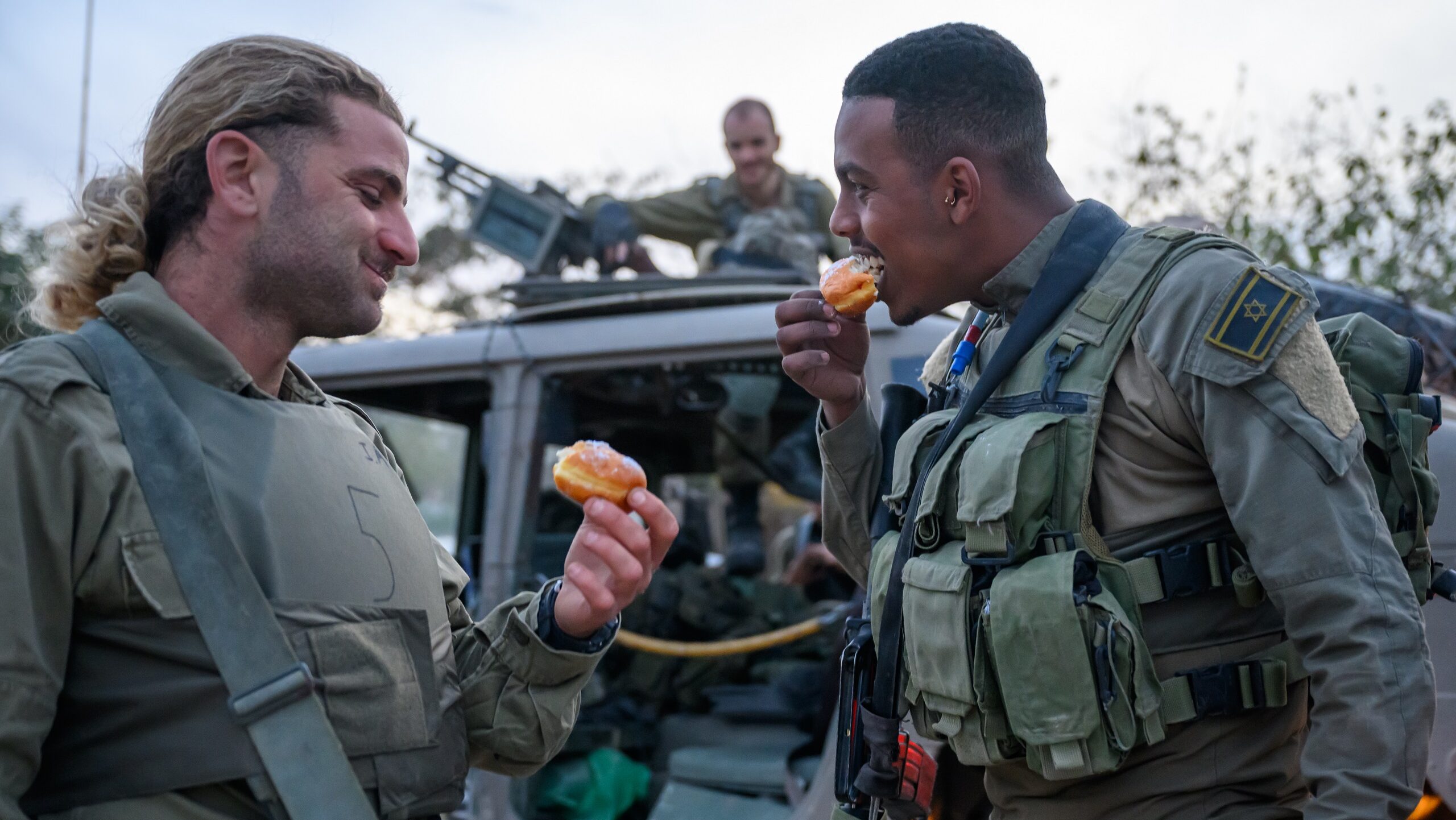Amid Darkness of War, Hanukkah Lights Up the Country
Soldiers and civilians prepare for the Festival of Lights
Israel is at war, but that is not stopping the public celebration of one of the country’s most beloved holidays, Hanukkah.
This ancient eight-day festival, which commemorates the Maccabees’ defeat of the Seleucid Greeks, the reestablishment of the Temple in Jerusalem, and the reclaiming of sovereignty over the land of Israel, is traditionally observed by lighting a menorah, an eight-branched candelabrum, daily. The holiday is also characterized by the consumption of oily foods. Favorites among Israelis are sufganiyot, a type of doughnut filled with jam or other sweets, and latkes, which are fried potato pancakes.
The typically joyous holiday, usually filled with numerous fairs, concerts, and family-friendly events nationwide, has been hampered by the ongoing conflict with Hamas in Gaza. Still, Israelis are doing everything they can to bring light into this otherwise dark time.
Initiatives include public gatherings at hotels that are housing some of the hundreds of thousands of evacuees from the north and south, programs by organizations assisting hostage families, and volunteer work by everyday people looking to make an impact.
Isrotel, Israel’s largest hotel chain, has been notably active in aiding evacuees, opening their properties in locations like Eilat, Tel Aviv, Jerusalem, and the Dead Sea. According to a statement to The Media Line, the chain has welcomed over 15,000 evacuees since the outbreak of the war on October 7. Alongside the offerings they provide on a day-to-day basis, they will be celebrating the holiday with various activities nationwide.
At the Royal Beach Tel Aviv Hotel, a Hanukkah event is held on the first day of the holiday. The event is “for the children of evacuees from Netiv HaAsara and Kiryat Shmona,” representatives for the hotel said. “At the event, there will be a DJ stand, craft booths, sweet treats, activity booths, distribution of doughnuts, and candle lighting.”
The Orient Hotel in Jerusalem, one of the country’s most luxurious hotels and a brand’s flagship, is home to evacuees from Kibbutz Or Haner. There, “different families will prepare their special holiday food each evening during Hanukkah with the hotel’s chef Ahmed Salma, accompanied by exciting stories. Among the dishes that will be served, are asado in a doughnut with strawberry chutney and Salsa sauce by Tal Peleg, the knishes by Panda, and the famous empanadas by Claudia and Haim.”
This holiday season, give to:
Truth and understanding
The Media Line's intrepid correspondents are in Israel, Gaza, Lebanon, Syria and Pakistan providing first-person reporting.
They all said they cover it.
We see it.
We report with just one agenda: the truth.


The chain stressed that they would “continue to mobilize in order to give all the evacuees a sense of home and to hold happy and exciting activities during the Hanukkah holiday, hoping to shed a little light on the complex period they are going through. The hotel staff will continue their dedicated work, in order to give the evacuees a comfortable and optimal climate that will help for them to feel at home—even if it is temporary.”
Another group that has been reeling since the war, in which 1,200 Israelis were killed and more than 240 taken hostage in Gaza, is the families of those held captive. Their strength has made the world sympathize with their plight as they yearn for their loved ones to return daily.
Some families have been fortunate to see their family members back in Israel after a weeklong cease-fire brought more than 100 home, yet the majority continue to wait in anxiety. In Tel Aviv, the plaza of the Tel Aviv Museum has been transformed into “Hostages Square,” with daily demonstrations and events occurring to bring awareness to their plight and advocate for the release of the hostages.
For the first night of Hanukkah, they held a large event for the public where they lit 138 branches, testifying to the number of remaining hostages in Gaza, with the help of the families of those being held.

Families of the hostages light 138 candles, one for each person still being held hostage, on the first night of Hanukkah at “Hostages Square” in Tel Aviv, Israel, Dec. 7, 2023. (Alexi J. Rosenfeld/Getty Images)
The soldiers of Israel serving inside Gaza or in bases across the country are not as fortunate to spend time with their families. This, however, does not stop nightly celebrations. Soldiers proudly announce on Army Radio the number of sufganiyot they are receiving from gracious donors and the countless menorahs they are lighting inside and outside the battlefield.
Besides donors, the IDF Logistics Corps will be providing 100,000 wax candle menorahs, 15,000 oil menorahs, 5,000 outdoor menorahs, hundreds of stand-up menorahs, more than 500,000 sufganiyot, 9,000 gluten-free doughnuts, and 17,000 vegan ones.
Veronique Hadjibay is one of those working overtime to provide for the soldiers during this time. Usually based out of New York, she runs a nonprofit called Gift of Giving International, and through it, she cooks 270 meals per week for needy families in New York.
Hadjibay was in Israel when the war broke out, and while most travelers fled on the first flight out, she decided she needed to stay and help. Having connections in the restaurant business in Jerusalem, she used their kitchens to cook 650 meals per day for soldiers across the country. However, once the restaurants decided it was time to reopen, Hadjibay agreed to keep working.
Since then, she has been traveling to bases north and south doing barbecues for soldiers four times per week and supplying them with essential goods.
For Hanukkah, she is having a massive barbecue on the fifth night of the festival for soldiers and family members that they have been unable to see for months now. This is alongside nightly candlelightings and the distribution of sufganiyot.
Alongside this, organizations such as Chabad are distributing thousands of menorahs and candles to soldiers and civilians alike to ensure that even during war, the light of the festival will continue to shine bright.



